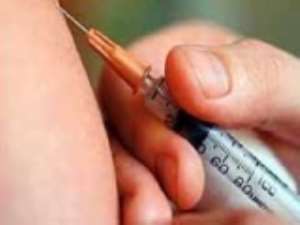
A REVOLUTIONARY cancer vaccine developed by an Australian scientist could be on sale within months after being declared safe and 100 per cent effective by a top US government committee.
The vaccine against cervical cancer, the No.2 cancer killer in women, was developed by Australian of the Year Dr Ian Frazer.
It would be prescribed to teens as young as 13 after the leading advisory board to the US Food and Drug Administration yesterday voted unanimously to support the drug Gardasil.
It came after studies showed it was completely effective in stopping a sexually transmitted virus that causes cervical cancer and kills 290,000 women a year worldwide.
It is estimated Gardasil could cut up to two-thirds of the cervical cancer deaths caused by the virus, human papillomavirus -- or HPV -- or about 191,000 lives a year around the world.
HPV is the most common sexually transmitted virus and affects more than 50 per cent of sexually active adults.
Next month the FDA is expected to follow the advisory board recommendation -- the drug is set to be on sale in the US within three months.
Gardasil would be given to children before they became sexually active and would consist of three shots over six months at a cost of up to $655.
"The data speaks for itself," Dr Frazer, who spent 20 years developing the vaccine, said.
"This is a vaccine that in several clinical trials done by several different groups has proven 100 per cent effective in preventing not only the infection that causes cervical cancer, but also the pre-cancer lesions of the disease that needs to be treated.
"With data like that, plus the excellent safety record the vaccine has demonstrated over the 25,000 women that have been given it, it would be surprising if they had not recommended it.
"With cancer the most common cause of death in Australia, we need to do everything we can to prevent the disease, as well as treating it."
Gardasil was developed by US company Merck and Australian biotech company CSL, which is expected to earn up to 7 per cent of the royalties from the drug's estimated global sales of $4.3 billion a year.
CSL would produce the drug under licence for the Australian market.




 Akufo-Addo commissions Phase II of Kaleo solar power plant
Akufo-Addo commissions Phase II of Kaleo solar power plant
 NDC panics over Bawumia’s visit to Pope Francis
NDC panics over Bawumia’s visit to Pope Francis
 EC blasts Mahama over “false” claims on recruitment of Returning Officers
EC blasts Mahama over “false” claims on recruitment of Returning Officers
 Lands Minister gives ultimatum to Future Global Resources to revamp Prestea/Bogo...
Lands Minister gives ultimatum to Future Global Resources to revamp Prestea/Bogo...
 Wa Naa appeals to Akufo-Addo to audit state lands in Wa
Wa Naa appeals to Akufo-Addo to audit state lands in Wa
 Prof Opoku-Agyemang misunderstood Bawumia’s ‘driver mate’ analogy – Miracles Abo...
Prof Opoku-Agyemang misunderstood Bawumia’s ‘driver mate’ analogy – Miracles Abo...
 EU confident Ghana will not sign Anti-LGBTQI Bill
EU confident Ghana will not sign Anti-LGBTQI Bill
 Suspend implementation of Planting for Food and Jobs for 2024 - Stakeholders
Suspend implementation of Planting for Food and Jobs for 2024 - Stakeholders
 Tema West Municipal Assembly gets Ghana's First Female Aircraft Marshaller as ne...
Tema West Municipal Assembly gets Ghana's First Female Aircraft Marshaller as ne...
 Dumsor is affecting us double, release timetable – Disability Federation to ECG
Dumsor is affecting us double, release timetable – Disability Federation to ECG
